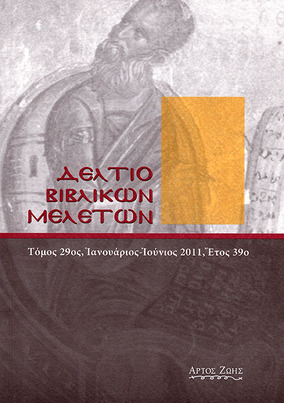Λουκ. 14, 15-24 : πρωτοχριστιανικά δείπνα και η αυτοσυνειδησία της κοινότητας του Λουκά
Part of : Δελτίο βιβλικών μελετών ; Vol.19, No.2, 2000, pages 22-32
Issue:
Pages:
22-32
Parallel Title:
Luk. 14,15-24 : table-fellowship and the self-consciousness of the Lukan community
Author:
Abstract:
Table-fellowship is a central issue for Luke. During their gatherings Christians expressed their self-consciousness as a new people abolishing barriers that existed between Jews and Gentiles, free and slave persons, men and women. This was not always and for everybody a self-evident realization as the history of early Christianity attests. The Parable of the Great Banquet is an accurate picture of Lukek community, consisting of poor and sinful Jews and a majority of Gentiles. Moreover, in comparison with the parallel text of Matthew, Luke emphasizes the universalistic aspect of the parable. This aspect can be found in several parts of his Gospel, which Matthew either omits or changes. It seems possible that some Christians of Jewish origin could not accept eating with gentile Christians and participating in the same Eucharist with them.The community of Luke obviously had the same problem. For this reason Luke in order to legitimize the common eucharistie tables stresses in any suitable situation this new reality in his Gospel. Especially in his Acts of the Apostles reworks the text from 8,4 to 11,19, in order to assign to Peter, James and the Jerusalem Church exactly the opposite roles than they originally played (according to Paul’s Galatians 1,13-2,21). With this rewriting of the Christian history of the common tables Luke presents the above mentioned figures as those who legitimated the practice his community followed. The subsequent history of Christianity justified Luke for his option for the common tables.
Subject:
Subject (LC):
Notes:
Περιέχει σημειώσεις




